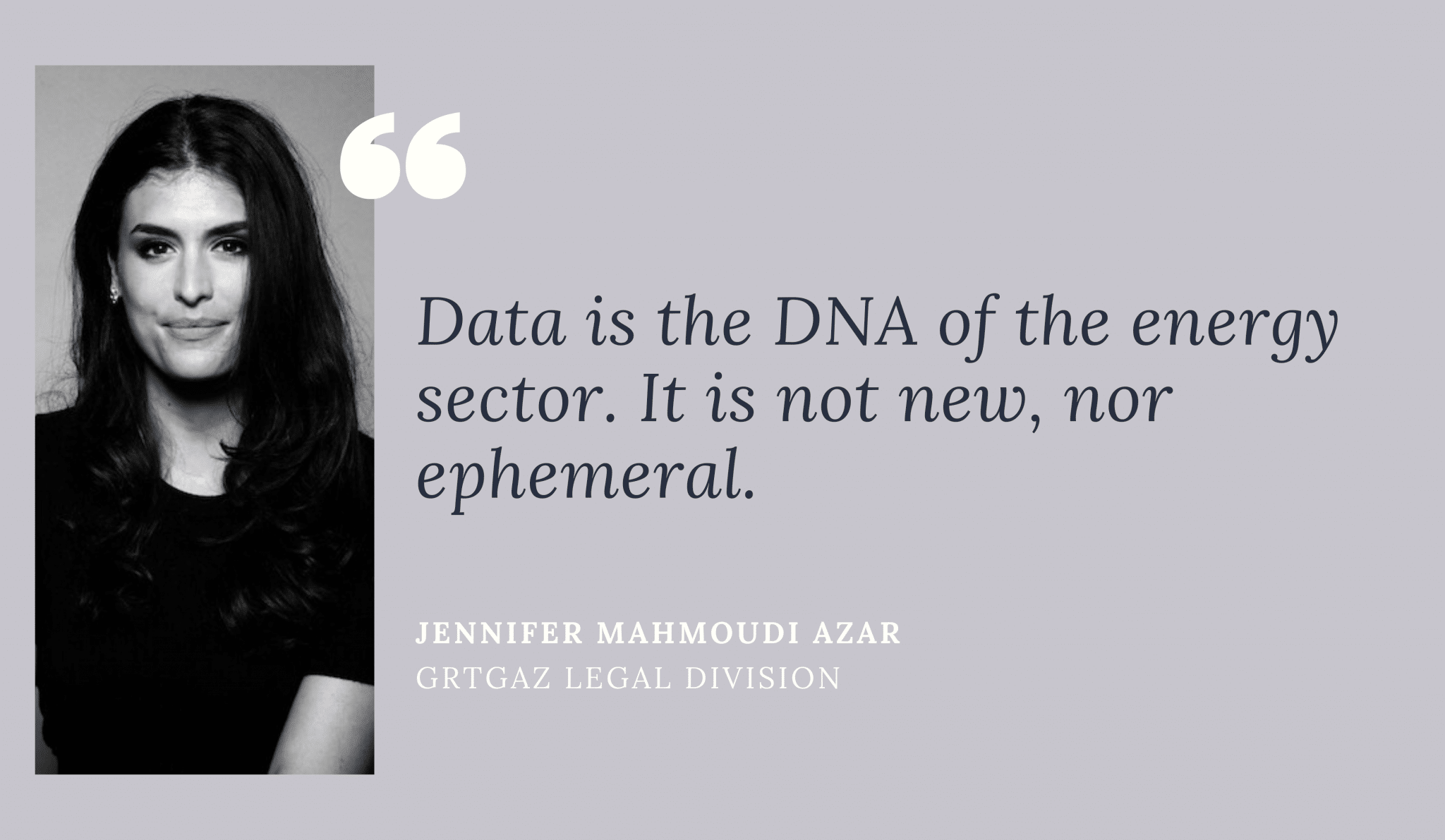Data: the DNA of the energy sector
Spotlight on Jennifer Mahmoudi Azar

In this interview, we spoke with Jennifer Mahmoudi Azar to get her take on the role of data in the energy sector and how it is affecting and challenging the current energy market and its stakeholders.
Jennifer, why the energy sector and what drives you in your career?
Energy concerns all of us, it is, at the same time, a universal and individual matter. It can be discussed on the international scene as well as at home. This is what I find attractive about the field.
I appreciate the multidisciplinary approach of the sector. It is not an insular or theoretical discipline. It is a field that involves several areas: science, economy, law, and information technologies, for example. It evolves and innovates constantly, and the legal aspects are becoming more lively. The energy sector requires wide knowledge of the field combined with daily and multidisciplinary intellectual curiosity.
This is what drives me in my career, working on legal issues in a sector which is highly sensitive and strategic such as energy, as well as comprehending energy law with all its historical dimensions and its constant permutations which give rise to profound changes and give me challenges throughout my working day.
What are the main challenges in the energy sector?
Nowadays, the energy sector is facing two transitions: ecological and digital. Both are motivating deep changes that are affecting and challenging the current energy market and its stakeholders. The former carries values such as the preservation of the environment – decarbonisation – and the collective goodwill embodied by the empowerment of individuals – decentralisation. The latter is bringing a strong digitalisation of energy systems and grids. Combined, they are highlighting a vision of the energy sector that is driven by two ideas: innovation and flexibility. Both require the rethinking of economic, regulatory, and social approaches.
The challenge is to redesign the sector with a new prism/vision. It is no longer relevant to talk about a mono-energy system but rather a multi-energy system. Digitalisation makes infrastructures more interconnected and sophisticated. Complementarity of the power systems has become indispensable to achieve maximum efficiency of energy assets. Interaction between infrastructure and energy sources leads stakeholders and their new projects and creates a substantial amount of data to analyse.
Digital technologies are facilitating and enabling these global trends (the 3Ds — decentralisation, decarbonisation, digitalisation) at each level of the energy value chain.
When it comes to data in the energy sector, how do big external players like Google play a role? Do you see them more as a driver for innovation or a threat?
Regarding data in the energy sector, it is essential to first clarify a point: data is an integral part of the sector.
Data elicits extensive media coverage, making it seem like a trendy phenomenon, but in reality, it is the DNA of the energy sector. Data is not new, nor ephemeral.
It is the core business of all energy operators. Data is omnipresent and decisive in energy markets.
<quote>
Like other sectors that have experienced a numerical revolution, it leads to the appearance of new stakeholders with new services in the market. The energy sector is in its early stages of digitalisation. And yet, these new services already have a strong added-value by creating a dynamic of valorisation of data based on the development of new business models.
The particularity of these new stakeholders (Google, Amazon etc.) is that they do not come from the energy sector. They are external, which stimulates competition, allowing them to penetrate a historical market composed of specificities and constraints. The emergence of new stakeholders is a driver for innovation. New business models around energy data are the drums of war faced with consumers who are more and more demanding (availability and instant treatment of data, personalised offers, development of local smart energy systems etc.) The energy value chain is being redesigned and it is startling to observe the emergence of the final customer as a pro-active stakeholder within the sector. Consumers can produce, store, sell and even share their production. Aware of the benefits of a competitive market, they are now holding a position as business partners along with the operators. All stakeholders and traditional business models are affected by these recent dynamics and new businesses bring new risks and opportunities.
How should regulators adjust to ensure they act as facilitators and not barriers in leveraging data within the energy sector?
Sectoral regulation requires a high level of expertise and experience, especially in the energy sector where the regulator must be a “field regulator”. To act as a facilitator, the regulator must be able to observe the evolution of its sector and adapt its regulatory tools. It aims to spread the best practices and act as an incentive for efficient solutions, without unnecessary regulatory interference.
Legal qualification of data is decisive to determine its ownership and thus, protection. Regulatory challenges are arising between the management of energy data and the development of associated services.
It is essential as a regulator to question the sector and try out new regulatory tools which are adapted to the circumstances.
Regulation intervenes to qualify the data and ensure its protection if required by laws and regulations, but also to ensure the accessibility and transparency of data and develop principles and values on data with ethical guidelines. For instance, the European Commission has set up a high-level expert group on ethical guidelines concerning artificial intelligence.
Recently appointed as data manager within the Legal Division of GRTgaz, it appears essential to define and build governance around data which is based on the quality and integrity of data. These are to me the sine qua non-conditions to use data as an instrument for management and leadership. The sector is evolving to new business models and new services based on the collection, treatment, and valorisation of data, regulation must be adaptative to empower final customers. New games imply new rules.
How does the deployment of new tech enable consumers?
If there is a way to appreciate the efficiency of the energy market, it is to observe the behaviour of consumers. They are more informed and conscious of the role they can play in this sector to stimulate competition. From final customers, they have become an active and disruptive stakeholder. They have recentered the focus to the level of their challenges and local dynamics. Transparency and competition are stimulated with this new strategic position of consumers which implies an evolution of the regulatory framework to reinforce the capacity of regulators to analyse the market.
Since the adoption of the Clean Energy for all Europeans package, each consumer has become a leading actor.
Empowering consumers of new tech will allow them to go beyond the learning process, reinforce their willpower and become top players among the new market drivers (regional or local authorities, companies, external stakeholders, individuals).
Nowadays, consumers want to have expert knowledge of their energy consumption. It is no longer about having access to data; the question is already on the next step: how they can manipulate or play with data and capitalise the knowledge connected to it to develop new energy solutions. New tech will amplify the interoperability of the energy systems which generate data and, combined with digitalisation, make consumers influential stakeholders.
 Jennifer Mahmoudi Azar joined the GRTgaz Legal Division in 2017 as a counsellor at law after a previous experience at Gaz réseau distribution France. Specialised in energy law, she guides the company and its management in their regulated and competitive activities regarding regulatory issues and strategic decisions (advice, contract, litigation).
Jennifer Mahmoudi Azar joined the GRTgaz Legal Division in 2017 as a counsellor at law after a previous experience at Gaz réseau distribution France. Specialised in energy law, she guides the company and its management in their regulated and competitive activities regarding regulatory issues and strategic decisions (advice, contract, litigation).
Don’t miss any update on this topic
Sign up for free and access the latest publications and insights













